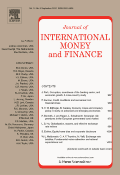
JOURNAL OF INTERNATIONAL MONEY AND FINANCE
Scope & Guideline
Unveiling insights into international finance trends.
Introduction
Aims and Scopes
- International Monetary Policy and Exchange Rates:
The journal extensively covers the dynamics of international monetary policy, exchange rate mechanisms, and their implications for global finance, emphasizing the interconnectedness of economies. - Financial Markets and Instruments:
Research on various financial instruments, including bonds, equities, and derivatives, is prevalent, focusing on their behavior under different economic conditions and regulatory frameworks. - Capital Flows and Global Financial Stability:
The journal addresses capital flows, their determinants, and their impact on financial stability, particularly in emerging markets, exploring both the risks and opportunities they present. - Macroeconomic Policy and Economic Growth:
A significant focus is placed on the relationship between macroeconomic policies (fiscal and monetary) and economic growth, analyzing how different approaches can lead to varying outcomes across countries. - Financial Crises and Contagion:
The journal frequently publishes studies on the causes and consequences of financial crises, including the mechanisms of contagion and systemic risk in the global financial system. - Behavioral Finance and Market Sentiment:
Emerging themes include the exploration of behavioral finance aspects, such as the impact of investor sentiment on market dynamics and financial decision-making.
Trending and Emerging
- Impact of COVID-19 on Financial Systems:
Recent papers increasingly explore the effects of the COVID-19 pandemic on global financial systems, including shifts in monetary policy, changes in capital flows, and the resilience of financial institutions. - Environmental, Social, and Governance (ESG) Factors:
There is a growing emphasis on ESG considerations, with research examining how these factors influence investment decisions, financial performance, and corporate governance. - Fintech and Digital Currencies:
The rise of fintech and digital currencies is a significant area of focus, reflecting the transformative impact of technology on financial systems, including the implications for monetary policy and financial regulation. - Geopolitical Risks and Economic Outcomes:
Emerging research addresses the interplay between geopolitical tensions and economic outcomes, particularly how such risks influence capital flows and investment strategies. - Behavioral Economics in Finance:
There is an increasing interest in behavioral economics and its implications for financial markets, exploring how psychological factors affect investor behavior and market dynamics.
Declining or Waning
- Traditional Currency Models:
Research centered on traditional currency models and fixed exchange rate systems has seen a decline, as the focus shifts towards more dynamic and flexible exchange rate mechanisms. - Static Risk Assessment Models:
There has been a noticeable decrease in studies utilizing static models for assessing financial risk, with a preference for more dynamic, adaptive models that account for changing market conditions. - Single-Economy Analyses:
Papers focusing exclusively on single-economy analyses are becoming less frequent, as researchers increasingly adopt a comparative or cross-country approach to highlight global interconnectedness. - Over-reliance on Historical Data:
There is a declining trend in the use of purely historical data analyses; newer studies are incorporating more real-time data and machine learning techniques to enhance predictive accuracy. - Isolated Monetary Policy Discussions:
Discussions that treat monetary policy in isolation without considering global interdependencies are becoming less common as the journal emphasizes the importance of integrated policy frameworks.
Similar Journals

Eurasian Economic Review
Bridging theory and practice in the economic sphere.Eurasian Economic Review is a premier academic journal dedicated to the dissemination of high-quality research in the field of economics, notably within the Eurasian context. Published by SPRINGER HEIDELBERG in Switzerland, this journal stands out with an impressive Q2 ranking in the 2023 category of Economics, Econometrics and Finance, reflecting its influential role in fostering scholarly dialogue. The journal encompasses a broad array of topics related to economic trends, policy impacts, and theoretical advancements, making it an essential resource for researchers, professionals, and students alike. With a consistent output since its inception in 2011, the Eurasian Economic Review is committed to providing open access to its valuable content, ensuring that important findings are widely available to the global research community. As a member of the top 9th percentile in Scopus rankings for its field, this journal uniquely positions itself as a vital conduit for innovative and impactful research in economics.

European Journal of Finance
Connecting theory with practice in the world of finance.European Journal of Finance is a prestigious publication specializing in the domains of finance, economics, and econometrics, published by Routledge Journals, Taylor & Francis Ltd. Established in 1995, this journal has become a vital resource for researchers, practitioners, and students, contributing significantly to the understanding of financial systems and markets. With its Q1 ranking in the Economics, Econometrics and Finance category, it stands out for its rigorous peer-reviewed articles that explore innovative theories, models, and empirical studies. The journal's impressive Scopus ranking of 35 out of 242 highlights its impact and relevance within the field, with an 85th percentile standing that underscores its importance to current financial research. Although it does not offer open access, the European Journal of Finance remains a cornerstone for those seeking to delve deeper into the complexities of finance, equipped with insights that drive both academic inquiry and practical application.
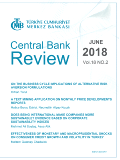
Central Bank Review
Shaping the discourse in economics and finance.Central Bank Review is a leading journal published by the CENTRAL BANK REPUBLIC TURKEY, dedicated to advancing the field of economics and finance. With an ISSN of 1303-0701 and an E-ISSN of 1305-8800, this open-access journal has been serving the academic community since 2016, providing a rich source of knowledge for researchers, professionals, and students alike. The journal focuses on a diverse range of topics within economics, econometrics, and finance, making it a valuable resource for those looking to stay at the forefront of these rapidly evolving fields. Notably, in 2023, it achieved a Q2 ranking in both Economics and Econometrics and Finance, highlighting its relevance and impact within the academic community, with Scopus rankings placing it in the top quartile of its categories. Central Bank Review not only contributes to rigorous academic discourse but also offers insights and policy discussions pertinent for central banking and economic policy, solidifying its importance in shaping the future of economic research. Located in the Netherlands, this journal provides easy access to its published articles, ensuring that vital research reaches readers globally.

JOURNAL OF FINANCIAL ECONOMICS
Transforming theoretical frameworks into practical solutions.Welcome to the JOURNAL OF FINANCIAL ECONOMICS, a premier publication in the realms of finance, economics, and accounting, published by Elsevier Science SA in the Netherlands. With its impactful contributions since 1974, this esteemed journal has earned an impressive impact factor and consistently ranks in the Q1 category across various fields, including Accounting, Economics and Econometrics, Finance, and Strategy and Management. Researchers can access cutting-edge studies that delve into both theoretical frameworks and empirical analyses, crucial for advancing financial literacy and economic policies globally. With remarkable Scopus rankings, notably placing #2 in Accounting and #6 in Finance, the journal serves not only as a reliable resource for academics but also as a vital tool for professionals seeking to stay abreast of the latest financial trends and insights. Engage with the latest research and contribute to the dialogue shaping the future of financial economics!

B E Journal of Macroeconomics
Pioneering research that shapes macroeconomic policy.B E Journal of Macroeconomics is a distinguished academic journal published by WALTER DE GRUYTER GMBH that serves as a critical platform for advancing the field of macroeconomic research. Established in 2001, it has gained recognition within the economics community, featuring a broad range of theories and empirical studies relevant to contemporary economic issues. With an impact factor reflective of its academic contributions, the journal is categorized in the Q3 quartile for Economics and Econometrics, ranking 607 out of 716 in its field according to Scopus metrics. The journal's scope includes a comprehensive exploration of macroeconomic trends, policy analysis, and the dynamics of economic systems, catering to researchers, practitioners, and students alike. Though primarily published in a traditional format, researchers have ample opportunities to access its invaluable content through institutional subscriptions, ensuring the dissemination of knowledge across the global economic landscape. Located in Berlin, Germany, B E Journal of Macroeconomics not only enriches the academic discourse but also fosters a deeper understanding of macroeconomic phenomena, making it an essential resource for anyone engaged in the field.

International Journal of Central Banking
Elevating Discourse on Global Financial SystemsInternational Journal of Central Banking is a premier academic journal dedicated to advancing the knowledge of central banking and its critical role in the global economy. Published by ASSOC INTERNATIONAL JOURNAL CENTRAL BANKING in Germany, this journal offers a platform for researchers, professionals, and students to explore innovative ideas and findings in the fields of economics, finance, and econometrics. With an impressive Q1 ranking in both Economics and Finance for 2023, the journal is widely recognized for its contribution to the discipline, providing insightful articles that address the complex challenges and dynamics faced by central banks today. Despite being a non-open access journal, it maintains a high impact within its scholarly community, encouraging rigorous peer-reviewed research and discourse. The journal's ongoing commitment to excellence ensures it remains a critical resource for those seeking to enhance their understanding of central banking and its implications for economic policy.
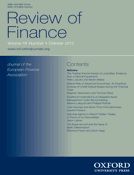
Review of Finance
Pioneering high-quality research in finance and beyond.The Review of Finance, published by Oxford University Press, stands as a premier academic journal in the fields of Finance, Accounting, and Economics. With an ISSN of 1572-3097 and an impressive track record stretching from 2001 to 2024, this journal is consistently recognized for its high-quality research, reflected in its Q1 rankings across key categories, including Accounting, Finance, and Economics and Econometrics. The Review of Finance is dedicated to advancing the understanding of financial phenomena through robust empirical and theoretical insights, making it an essential resource for researchers and professionals alike. Additionally, its strong Scopus rankings, placing it in the top percentiles, highlight its influence and relevance in ongoing academic discourse. Although the journal is not open access, it remains widely accessible through academic institutions, ensuring that its valuable contributions reach an extensive audience. The editorial board invites submissions that promise to further engage the academic community in the dynamic intersections of finance, accounting, and economic research.

JOURNAL OF MONEY CREDIT AND BANKING
Connecting Theory with Practice in BankingJOURNAL OF MONEY CREDIT AND BANKING, published by Wiley, stands as a premier academic outlet in the domains of finance, economics, and accounting. With an ISSN of 0022-2879 and an E-ISSN of 1538-4616, this journal serves as a vital resource for researchers seeking to explore the dynamic interactions between money, credit, and banking systems. Compiling groundbreaking research since its inception, the journal boasts an impressive Q1 quartile ranking across key categories in the 2023 metrics, reflecting its prestige in the fields of Accounting, Economics, and Finance. It ranks among the top in its class with a Scopus ranking that underscores its contribution and influence in scholarly discourse, especially in the evolving contexts of economic policy and financial markets. Although not available as an open-access publication, the journal’s commitment to high-quality peer-reviewed research makes it indispensable for professionals, students, and academicians aiming to stay abreast of developments in monetary theory and practice. With the aim of fostering scholarly exchanges, the JOURNAL OF MONEY CREDIT AND BANKING remains a cornerstone for advancing understanding and application of critical financial concepts.
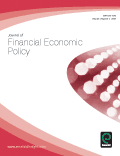
Journal of Financial Economic Policy
Driving scholarly discourse on financial policies and economic challenges.Journal of Financial Economic Policy is a premier academic journal published by EMERALD GROUP PUBLISHING LTD, focusing on the intersection of finance and economics. Through rigorous peer-reviewed research, the journal aims to advance understanding of financial policies and economic frameworks, addressing critical issues faced by financial markets and institutions. With an ISSN of 1757-6385 and an E-ISSN of 1757-6393, it serves as a reputable source of information for researchers, professionals, and students alike. The journal operates within the United Kingdom and is recognized for its contributions to the fields of economics and finance, achieving a Q3 category ranking in both disciplines as per the 2023 metrics. This places it within the top half of journals in its category according to Scopus ranks, demonstrating a solid impact in the academic community. Although it is not an open-access journal, the insights and analyses published are invaluable for those seeking to grasp complex financial phenomena and develop effective policies. The journal’s scope encompasses a wide range of topics relevant to contemporary finance and economic strategies, making it an essential resource for ongoing scholarly discourse and practical applications.
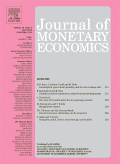
JOURNAL OF MONETARY ECONOMICS
Exploring the Dynamics of Financial SystemsJOURNAL OF MONETARY ECONOMICS, published by Elsevier, stands as a premier platform for scholars and practitioners in the field of monetary economics. With a robust ISSN of 0304-3932 and E-ISSN 1873-1295, this esteemed journal has maintained a significant influence since its inception in 1975, continuing its legacy of rigorous scholarship through to 2024. The journal is recognized for its high impact in the field, boasting a Q1 category in both Economics and Econometrics and Finance as per the 2023 rankings. Its Scopus rankings underscore its prominence, with a top percentile standing in critical categories—a testament to its critical role in advancing research and discourse. While not an open-access publication, it offers invaluable insights for those dedicated to understanding complex fiscal dynamics and economic policies. The Journal of Monetary Economics serves as an essential resource for researchers, professionals, and students eager to explore the intricacies of financial systems and economic theory.